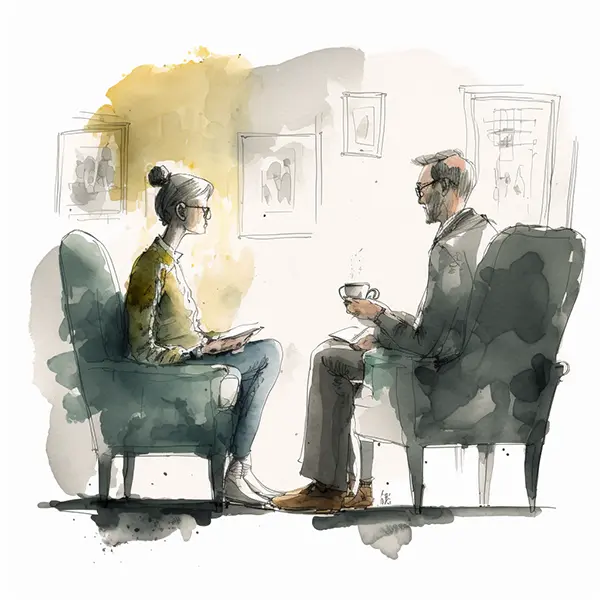Therapy for Depression and Anxiety.

Experiencing depression and anxiety.
Depression and anxiety are experiences that affect almost every human being in some form in their lives. We can feel depressed after a breakup or losing a job. Anxiety can show up when taking a test, preparing for a presentation, or asking someone for help. However, sometimes depression and anxiety can become more problematic in our daily lives, and the symptoms begin to decrease our quality of life. This is when therapy may be needed.
How therapy works.
My approach to therapy is quite simple. You are the expert on your life, and I am a partner in discovering why you have depression and anxiety, where it shows up in your daily life, and how you can make small changes to reduce your symptoms. What you are experiencing is most important in our therapeutic relationship. How we figure out how to improve your well-being is based on four principles of therapy. Put simply, we will figure out how you think, what are patterns in your life, what you may consider changing, and what type of healthy relationships are needed for support. Each one of these are described in more detail below.
How we think.
Anxiety and depression are largely due to our relationship with thoughts, feelings and behaviors. When we learn how we think (or think about our thinking), we can find negative patterns that influence how we behave and feel. The idea is to learn how we think and develop more adaptive ways of thinking and behaving to naturally feel better.
Knowing what you don’t know.
Our past experiences and perceptions often play a significant role in our mood when faced with life challenges. This requires exploring unconscious thoughts and feelings contributing to depression and anxiety. This is also called gaining insights into past experiences that influence present moods and behaviors. We look at the underlying cause of your depression and anxiety rather than present thoughts. This helps us understand what triggers depression and anxiety.
Small changes help.
When we feel depressed, we can gradually stop participating in healthy activities. For some, depression means being unable to get out of bed or having difficulty sleeping. Anxiety can make us feel afraid and paralyzed to do something different. We might avoid going to the store because being around crowds and making purchase decisions can feel overwhelming. Psychotherapy aims to gradually identify and engage in activities that can improve mood and increase a sense of pleasure and accomplishment. For some, it can be as simple as calling a friend once a week. For others, it might mean committing to showering each day. Either way, it is specific to your level of anxiety and depression and how much you want to change.
Improving relationships.
Human relationships are critical to mental health. Improving communication and relationships with others can drastically increase our self-esteem and self-worth. The goal is to explore relationship problems, learn better communication methods, set boundaries, and advocate for ourselves. Learning how to communicate to improve your mental health is a powerful skill.
How to start therapy?
Good questions! The first thing to do is reach out for a phone consultation. This is a brief call where I will gather information about what is bringing you to therapy and what you would like to see improve. From there, we determine if therapy is needed and if I am the right fit for you. After that, we schedule your initial appointment to meet in person and conduct a diagnostic evaluation. This is a session where I ask many questions to learn about you and determine what goals we want to tackle. If we still determine that therapy is needed, we will begin our work based on the abovementioned four principles.
How long will it take?
There is no specific timeline of therapy that will determine your increased quality of life. The severity and duration of your symptoms, your past therapy experiences, and the work you put in between our sessions determine the length of treatment. I subscribe to a goal-oriented process of treatment. We will determine exactly what you want to improve and stay focused on those goals. If other issues arise, we can evaluate our goals and adjust accordingly. No matter the timeline, my goal is to help you feel better or find someone you can see that will.
Let me say that it takes strength to ask for help. One of the biggest reasons people do not go to therapy is stigma and fear of what other people will think. Sadly, stigma as a barrier to treatment leads to increased anxiety, depression, and suicidal behaviors. Depression and anxiety are manageable and seeing if therapy is right for you never hurts.
To learn more about Anxiety and Depression, you can visit the Anxiety and Depression Association of America.
Call Now
Or fill out a contact form
